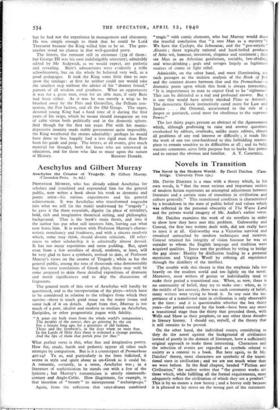Aeschylus and Gilbert Murray
Aeschylus the Creator of Tragedy. By Gilbert Murray. (Clarendon Press. 7s. 6d.)
PROFESSOR MURRAY, who has already edited Aeschylus for scholars and translated and expounded him for the general
public, now writes a book about his work as dramatic and poetic artist—his various experiments and his general
achievement. It was Aeschylus who transformed tragoedia into what we still (in the main) understand by " tragedy " ; he gave it the three essentials, dignity (in place of triviality),
bold, rich and imaginative theatrical setting, and philosophic background. That is the book's main thesis, and into it the author has put what still interests him, leaving out what now bores him. It is written with Professor Murray's charac- teristic trenchancy and frankness, and with a sincere modesty which, some may think, should disarm criticism. Of refer- ences to other scholarship it is admittedly almost devoid.
It has too many repetitions and some padding. But, apart even from a few novelties of detail, students, at least, will be very glad to have a synthesis, revised to date, of Professor Murray's views on the creator of Tragedy ; while as for the general public, among the tens of thousands who demonstrably buy his verse translations of Greek plays, there may well be some prepared to skim these detailed expositions of dramatic and moral significances and to skip the discussions of fragments.
The general truth of this view of Aeschylus will hardly be questioned, and in the interpretation of the plays—which have to be considered in relation to the trilogies from which they survive—there is much good sense on the major issues and some lack of it on details. Apart from that, Murray is too much of a poet, idealist and modern to mediate an Aeschylus, Euripides, or other pragmatistic pagan with fidelity.
"A great cry bath risen from the whole world's compassion ; The peoples of the sunset, they go grieving by the sea For a beauty long ago, for a greatness of old fashion, Thine and thy brethren's, in the days when ye were free. In the Lords of Holy Asia there is wakened a strange passion, And the lips of them that perish pine for thee."
What perfect verse is this, what fine and imaginative poetry.
How flat, crude, harsh and pedantic appear all other such attempts by comparison. But is it a counterpart of Prometheus 407-14? To us, and particularly in the lines italicised, it seems in style and spirit about as un-Greek as it could be. A romantic, certainly, in a sense, Aeschylus was ; in a
literature of sophistication he stands out with a few of the lyricists ; but Murray's romanticism is utterly nineteenth- century and Anglo-Celtic. How illegitimate, for example, is that insertion of " beauty " to misrepresent " archaioprepe." Again, from the reflection that satyr-drama combined " tragic " with comic elements, who but Murray would draw the trustful conclusion that " is sees Man as a mystery "?
We have the Cyclops, the Ichneutae, and the " pro-satyric " Alcestis ; three typically rational and hard-boiled products
of Attic wit, humour, invention, elegance and sentiment ; they see Man as an Athenian gentleman, sociable, law-abiding, and wine-drinking ; gods and savages largely as legitimate sources of comic or light relief.
Admirable, on the other hand, and most illuminating, are such passages as the incisive analysis of the Book of lob and the contrast drawn between that and the Prometheus—a dramatic poem upon which this book is always interesting. "It is impertinence in man to expect God to be 'righteous.' This can be defended as a real and profound answer. But it is one that would have utterly shocked Plato or Aristotle. The democratic Greek instinctively cared more for Law and Justice . . . the Oriental, accustomed to the rule of a despot or patriarch, cared most for obedience to the supreme Power."
The last thirty pages present an abstract of the Agamemnon which, although professing to raise and answer questions overlooked by editors, overlooks, unlike many editors, almost all problems of any real interest or difficulty ; it reads like the work of one too case-hardened to this forbidding master- piece to remain sensitive to its difficulties at all ; and its bald, staccato comments serve little purpose but to burke fine points and to extract the obvious and familiar. A. Y. CAMPBELL.


































 Previous page
Previous page